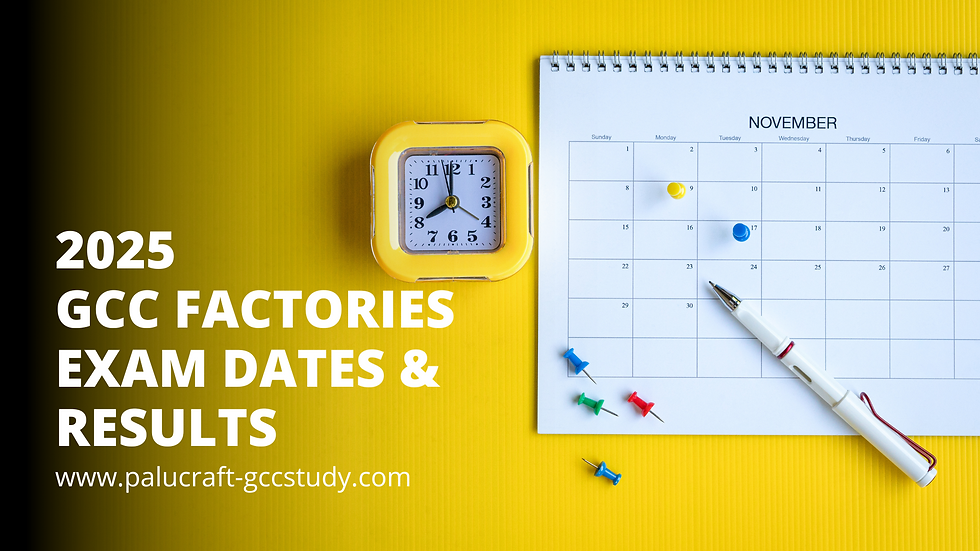GCC Factories Acceptable Trades and Experience
- Nkululeko Thusini

- Nov 16, 2022
- 3 min read
Updated: Nov 6, 2024
The great thing about the GCC Factories is that it allows technicians and artisans to become Certificated Engineers and possibly secure the lucrative GMR 2.1 role. You can become a Certificated Engineer by obtaining the GCC Factories.
The first step to starting the GCC Factories journey is meeting the entry requirements to be permitted to write the exams by the Department of Employment and Labour.
The entry requirements include qualifications, subjects, trade, and experience.
This post aims to provide guidelines on the trade and experience requirements for artisans wishing to pursue a career as a Certificated Engineer by obtaining the GCC Factories.
What are the GCC Factories Acceptable Trades and Experience?
The Department of Employment and Labour provides a list of acceptable trades and experience as presented in the table below.
There are a couple of things that you need to understand from the Department's list.
First, let's consider the trades:
The list of trades available in the latest Department guidelines consists of the old trades.
You will notice that the Department's list may need to include some of the Quality Council for Trades and Occupations (QCTO) trades. So, take the list of trades with a pinch of salt.
In general, electrical and mechanical trades are acceptable for possible consideration as a GCC Factories Candidate. So, if you can't see your trade on the table, submit your application for review: Provided you meet the other GCC Factories requirements.
You will need to have your trade test before submitting your application. You must complete the minimum educational/qualification requirements, serve the minimum experiential training, pass your trade test, and obtain a trade test certificate from the QCTO.
Over and above having your trade test, you also need to have the National Technical N6 Diploma in mechanical or electrical engineering. Click here for the subject requirements for the National Technical N6 Diploma.
Secondly, let's consider the experience (Years):
The years in the table refer to the minimum appropriate post-apprenticeship experience in the general maintenance and operation of machinery.
The Department refers to "post-apprenticeship experience," but we have seen evaluations based on post-trade-test experience. Remember, completing the apprenticeship is not the last step. You still need to do the trade test before being issued your trade certificate. Theoretically, there is a small gap between apprenticeship and getting the trade test. Still, it does happen for some candidates that this period may be longer. So, take the "post-apprentice experience" as post-trade experience.
The post-apprentice experience needs to be in the general maintenance and operation of machinery. For example, three years working as a boilermaker will not be an appropriate post-apprentice experience. Click here for guidelines on what the Department may not be appropriate maintenance and operation of machinery experience.
At least one year of post-apprentice experience needs to be in a factory.
TRADE | YEARS |
Aero-engine fitter, ground engineer, or equivalent | 2 |
Armature Winder | 3 |
Blacksmith | 3 |
Boilermaker | 3 |
Diesel Mechanic | 3 |
Electrician | 2 |
Engine-room Artificer | 2 |
Fitter | 2 |
Fitter and Armourer | 3 |
Fitter and Rigger | 2 |
Fitter and Turner | 2 |
Instrument Mechanic or Instrument Maker | 2 |
Instrument Technician | 2 |
Lift Mechanic | 2 |
Millwright | 2 |
Motor Mechanic | 3 |
Refrigeration Mechanic | 3 |
Tool and Die Maker | 2 |
Turner | 3 |
Welder | 4 |
Did you get your GCC Factories acceptance letter from the Department of Labour?
Join our industry-leading GCC Factories Plant Engineering Programme to ensure that you get the insights, guidance, and resources to pass the exam the first time.



Comments